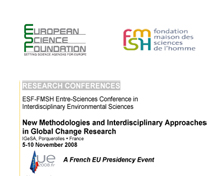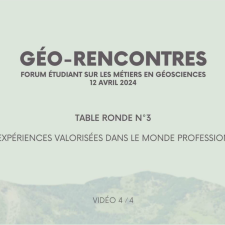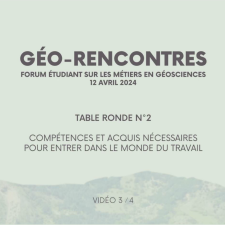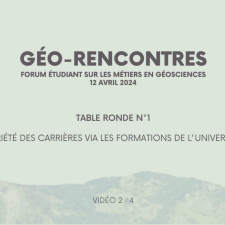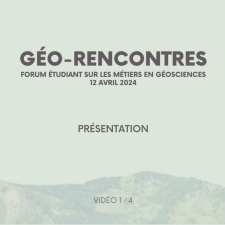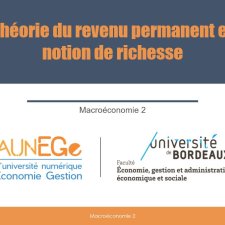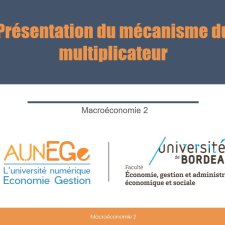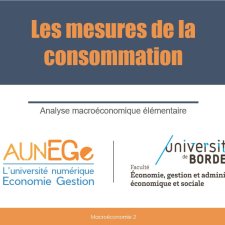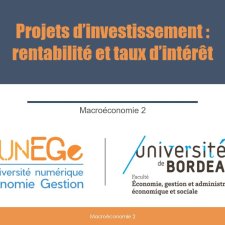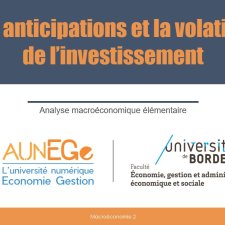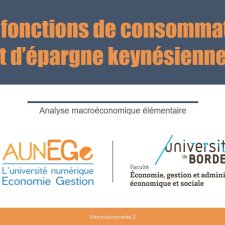Notice
Data-Model Fusion Approach in Global Change Research: Recent Development and Future Challenges
- document 1 document 2 document 3
- niveau 1 niveau 2 niveau 3
Descriptif
It is increasingly recognized that global change research requires methods and strategies for combing process models and data in systematic ways. This is leading to research towards the application of model-data fusion approach. The model-data fusion is a new quantitative approach to model analysis and data assimilation that provides a high level of empirical constraint over model predictions based on observations. Applications of model-data fusion require (a) a model that describes the underlying physical, chemical and biological processes, (b) experimental observations and (c) an optimization tool. The optimization tool is used to find optimal estimates of model parameters or states by minimizing the differences between model predictions and experimental observations. Finding the optimal parameters can help us improve predictions or test alternative hypotheses embedded in the models. Model-data fusion can be used in several different ways: to estimate parameter values or in a sensitivity study that can be used to identify the observations required to estimate model parameters or to test our hypotheses. In this paper, we will review recent applications of model-data fusion in global ecology and paleoecology studies and highlight current progress and issues, potential problems and future challenges.
Intervention / Responsable scientifique
Dans la même collection
-
Global Climate Change: Past and Future
MannMichael E.My presentation will begin with a review of the now-solid evidence for a human influence on the climate of recent decades. Such evidence includes instrumental measurements available for the past two
-
Modelling Forced and Internal Climate Variability During the Last Millennium
GoosseHughesAt hemispheric scale, the surface temperature is strongly influenced by the 28 variations of the natural (solar and volcanic) and anthropogenic (land-use, sulphate aerosols, greenhouse gas
-
Setting Cumulative Emissions Targets to Reduce the Risk of "Dangerous" Climate Change
ZickfeldKirstenThe ultimate objective of climate change mitigation is to reduce the amount of anthropogenic greenhouse gas (GHG) emissions in order to achieve “stabilization of greenhouse gas concentrations in the
-
Debate
CiaisPhilippeSeguinBernardChauvinDominiqueThe European Science Foundation (ESF) and the French Foundation of the Maison des Sciences de l’Homme (FMSH) (within the Entre-Sciences programme) have agreed to jointly develop a new conference
-
The Intergovernmental Panel on Climate Change and the Challenges of Climate policy, Equity and Ethi…
SomervilleRichardThe 2007 Intergovernmental Panel on Climate Change (IPCC) report provides clear guidance for the greenhouse gas emissions reductions needed to limit global warming to specific targets such as 2 °C
-
The Costs of Strategic Adaptation in a Simple Conceptual of Climate Change
MillnerAntonyA simple theoretical model of the process of strategic adaptation to climate change is proposed. Climate change is represented by a non-stationary Markov process on the space of climate states, and
-
Holocene Climatic Changes and Their Effect on Morphodynamics and Sedimentation in Campania
AmatoVincenzoHigh-resolution paleoclimatic studies (e.g. 18O, 13C, CH4, MS, ect) provide 38 detailed reconstructions of the Holocene climatic variability, but they don’t are unable to provide direct informations
-
Debate
JoussaumeSylviePlantonSergeGonzales RoucoJesus FelipeGoosseHughesReissellAnniBrasseurGuyThe European Science Foundation (ESF) and the French Foundation of the Maison des Sciences de l’Homme (FMSH) (within the Entre-Sciences programme) have agreed to jointly develop a new conference
-
Climate, Geography and Macroeconomics: Revised Data, Refined Analysis and New Findings
FüsselHans-MartinAssessments of social and economic impacts of climate change are primarily based on the results of biophysical climate impact models, which are aggregated, extrapolated and/or valued in monetary terms
-
The Effect of Thermal Pollution on Benthic Foraminiferal Assemblages, in the Mediterranean Shore Fa…
ArieliRuthieOver the past several decades public and scientific awareness to global warming has increased significantly. As a result, many studies have examined the affects of global warming. However, the
-
International Negociations on Climate Change: How to Take Advantage of Risk Aversion to Improve the…
ThoronSylvieClimate change is one of the best examples of global environmental problems. Countries are conscious that they have to find a solution to this global problem at the international level. Negotiations
-
IPCC Working Group I
SomervilleRichardThe European Science Foundation (ESF) and the French Foundation of the Maison des Sciences de l’Homme (FMSH) (within the Entre-Sciences programme) have agreed to jointly develop a new conference
Sur le même thème
-
Géo-Rencontres 2024 / Les expériences valorisées dans le monde professionnel
LilloEmmaAraujoJulieHuartFlorianDubreuRomainBuquetDamienChazalLauraBorieMarianeForum sur les métiers en géosciences organisé par les étudiants du CMI Ingénierie Géologique et Civile, Université de Bordeaux, 12 avril 2024
-
Géo-Rencontres 2024 / Compétences et acquis nécessaires pour entrer dans le monde du travail
BrinonJulietteAmoleFili-FenuaPretouFrédéricCampetHugoLiébauxAlbinDe AlemeidaMarie-LouPoirierAymericDufrenoyAudreyForum sur les métiers en géosciences organisé par les étudiants du CMI Ingénierie Géologique et Civile, Université de Bordeaux, 12 avril 2024
-
Géo-Rencontres 2024 / Variété des carrières via les formations de l'université
InguimbertDianeLacazeRomaneLemaitreLaurieChazalLauraMontjeanPascalPoudevigneJacquesPortefaixFrédéricForum sur les métiers en géosciences organisé par les étudiants du CMI Ingénierie Géologique et Civile, Université de Bordeaux, 12 avril 2024
-
Géo-Rencontres 2024 / Présentation
LatasteJean-FrançoisLavieThéoForum sur les métiers en géosciences organisé par les étudiants du CMI Ingénierie Géologique et Civile, Université de Bordeaux, 12 avril 2024
-
Tokyo, plus grande « ville » au monde : aménager et gouverner la démesure
Languillon-AusselRaphaëlAvec ses quelques trente-cinq millions d’habitants, Tokyo est la « ville » la plus peuplée au monde, et l’une des métropoles les plus riches. Cette présentation vise à décrire, analyser et expliquer,
-
La théorie du revenu permanent et la notion de richesse
Maveyraud-TricoireSamuelLa théorie du revenu permanent et la notion de richesse
-
Présentation du mécanisme du multiplicateur
Maveyraud-TricoireSamuelPrésentation du mécanisme du multiplicateur
-
-
Projet d'investissement : rentabilité et taux d'intérêt
Maveyraud-TricoireSamuelProjet d'investissement : rentabilité et taux d'intérêt
-
Les anticipations et la volatilité de l'investissement
Maveyraud-TricoireSamuelles anticipations et la volatilité de l'investissement
-
Les fonctions de consommation et d’épargne keynésiennes
Maveyraud-TricoireSamuelLes fonctions de consommation et d’épargne keynésiennes
-
La détermination du PIB à court terme
Maveyraud-TricoireSamuelLa détermination du PIB à court terme


